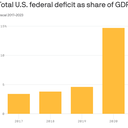Behind the IMF's warning to Biden and Congress on deficit spending

President Biden insists he's committed to cutting federal deficits. The International Monetary Fund doesn't seem convinced he'll go far enough.
Why it matters: Inside the IMF's semi-annual "Fiscal Monitor" report there's a direct warning for the White House and Congress: Check your deficit spending.
- In the dry language of staff economists, the IMF is sounding the alarm about the "large fiscal slippages" in the U.S. — and the effect continued deficit spending will have on overall public debt.
- China also comes in for criticism.
- "In both economies, public debt is projected under current policies to nearly double by 2053," the report says.
- "How these two economies manage their fiscal policies could therefore have profound effects on the global economy and pose significant risks."
Driving the news: The IMF report — "Fiscal Policy in the Great Election Year" — was released this week at the fund's spring meetings in Washington.
- It arrives as the cost of servicing the U.S. debt has been getting more expensive all year, with the 10-year Treasury yield closing at 4.6% yesterday. That's up from 4.1% from just six weeks ago.
- Interest payments on the debt are projected to cost $870 billion for the year, according a new analysis from the Committee for a Responsible Federal Budget.
By the numbers: Under President Trump, deficit spending reached new highs as he responded to COVID-19 with a slew of spending packages. The deficit more than tripled to $3.1 trillion in fiscal 2020, up from $984 billion in fiscal 2019, according to the Congressional Budget Office.
- That amounted to a whopping 14.7% of GDP. Deficits also rose because of Trump's corporate tax cuts.
- Biden began his presidency by ramming a $1.9 trillion stimulus package through Congress with only Democratic votes. That contributed to a $2.8 trillion deficit in FY 2021 (12.1% of GDP).
- In Biden's first full year as president, FY 2022, the federal government spent $1.4 trillion more than it raised in revenue (5.4% of GDP). In FY 2023, the deficit jumped up to $1.7 trillion (6.3% of GDP).
What they're saying: The White House says it plans to lower deficit spending by $3 trillion over 10 years, and blames Republicans in Congress for not working with Biden to increase taxes on corporations and the wealthy to raise more revenue.
- "The Trump tax cuts added $2 trillion to the debt with unpaid giveaways skewed to the wealthy and big corporations, and now congressional Republicans are proposing another $5.5 trillion in tax cuts skewed to the rich," White House spokesperson Michael Kikukawa told Axios.
Between the lines: Biden frequently claims he reduced the deficit by a trillion dollars. His math isn't wrong, but it's a little misleading.
- He's comparing FY 2021 numbers (which were juiced by COVID spending) with FY 2022 numbers (when the pandemic was receding).
- Independent fact checkers have labeled his claim "half true."
- Biden's latest budget does contain $3 trillion in deficit reduction, which he hopes to achieve by rolling back Trump's tax cuts and raising taxes on billionaires and large corporations.
- Even if the Biden administration persuaded Congress to raise those taxes, his long-term deficits would still be well historic norms, Axios's Neil Irwin notes.
Zoom out: When it comes to deficit spending, the last four presidents have more in common with each other than they might admit.
- President George W. Bush passed massive tax cuts that didn't pay for themselves, as he'd promised.
- In early 2009, with the global economy in tatters, President Obama was in firefighter mode. He wasn't overly concerned with deficit spending when he signed a nearly $1 trillion stimulus bill into law.
- He later codified Bush's tax cuts when he was negotiating with congressional Republicans, which also increased long-term deficits.
Zoom in: Biden has insisted that his Inflation Reduction Act (IRA) — which included billions in climate spending, health care savings and more money for IRS enforcement — would reduce the deficit by $300 billion over 10 years.
- That might have been true at the time. It's doubtful now.
- As part of the debt-ceiling deal, Republicans insisted on cutting IRS funding, which will translate into less revenue for the government.
- The popularity of Biden's EV and other clean-energy tax credits also raised the price tag of the IRA's climate provisions from $400 billion to as much as $1.2 trillion, according to some estimates.
The bottom line: It's not just the U.S. and China that come in for blame from the IMF. Britain and Italy are also in the dog house.
- "China, Italy, the United Kingdom, and the United States ... critically need to take policy action to address fundamental imbalances between spending and revenues," the IMF said.